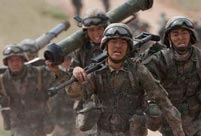

WASHINGTON, June 12 -- The visit to the United States by Fan Changlong, vice chairman of China's Central Military Commission, despite the rift over the South China Sea and cyber issue, showcases a maturing military relationship that helps ease tensions between the two countries, U.S. experts said Friday.
"General Fan's continuation of his visit despite the recent cyber allegations and P-8 overflights of the South China Sea suggest a maturing and routinization of military dialogue," Douglas Paal, vice president for studies at the Carnegie Endowment for International Peace, told Xinhua in an interview.
He was referring to the U.S. dispatching of P-8 reconnaissance plane to fly over the islands and reefs in the South China Sea where China is undergoing construction projects, and the recent U. S. allegations about China's hacking of U.S. federal personnel office's computer networks, which have raised the tensions in the China-U.S. ties.
Such dialogue "might help avert future crises" between the great powers, Paal said.
Michael O'hanlon, director of research on foreign policy at the Brookings Institution, said that, though his expectations for Fan' s visit to ease the China-U.S. tensions are modest, he still thought "it's still good to do these things." "It's good to have channels of communication. Sometimes the best you can hope for is that you limit the fallout from disagreements, " he told Xinhua in an interview.
Fan held talks Thursday at the Pentagon with U.S. Defense Secretary Ashton Carter during which they discussed a range of issues of mutual concern, including the military-to-military relationship, Taiwan, Japan and maritime issues, including the South China Sea dispute.
The two leaders reaffirmed their commitment to building a sustained and substantive military-to-military relationship based on mutual trust, cooperation, non-conflict and sustainability.
During Fan's week-long visit, which is seen as part of the preparations for the September state visit to the U.S. by Chinese President Xi Jinping, the Chinese military delegation has taken "a constructive approach," Paal noted.
The high-level Chinese military delegation headed by Fan, which started its U.S. trip on Monday, has already visited such places as a Boeing factory in Seattle, the Naval Air Station North Island in San Diego, and the U.S. Army base at Fort Hood, Texas.
"Continued military dialogue and low level exercises seem to be a likely outcome" of Fan's visit to the United States, he said.
There is also a prospect for greater exchanges of military visits, more cooperation on humanitarian assistance and disaster relief, for which the two militaries have the greatest contributions to make in Asia, he said.
"Improved forms of direct communications and progress toward a Memorandum of Understanding on aerial encounters are additional prospects," he added.
Asked if the talks will help ease tensions over the South China Sea dispute, Paal said while it was desired that Washington will lower its volume of criticism of China and focus more on imposing practical rules of the road while China will reassure that it has no military objectives in the region, but he is "not hopeful for either outcome."
At the same time, Paal cautioned against being over optimistic about easing the tensions over the cyber security issue, especially after the recent U.S. allegations about China's hacking of its computer networks, which was firmly rejected by China.
O'hanlon said he had higher expectations for President Xi's state visit to the U.S. in September, during which the two countries might reach some agreement on the South China Sea rift to "really substantially scale back the tensions."
"I think it's good to build these relationships, these lines of communications, but you have to be patient and keep expectations modest," he said.
 Abandoned village swallowed by nature
Abandoned village swallowed by nature Graduation: the time to show beauty in strength
Graduation: the time to show beauty in strength School life of students in a military college
School life of students in a military college Top 16 Chinese cities with the best air quality in 2014
Top 16 Chinese cities with the best air quality in 2014 Mysterious “sky road” in Mount Dawagengzha
Mysterious “sky road” in Mount Dawagengzha Students with Weifang Medical University take graduation photos
Students with Weifang Medical University take graduation photos PLA soldiers conduct 10-kilometer long range raid
PLA soldiers conduct 10-kilometer long range raid Stars who aced national exams
Stars who aced national exams
 PLA helicopters travel 2,000 kilometers in maneuver drill
PLA helicopters travel 2,000 kilometers in maneuver drill Investment slows to 15-year low
Investment slows to 15-year low China, Myanmar focus on win-win ties
China, Myanmar focus on win-win ties Dangerous stigma
Dangerous stigma Smashing drug addiction
Smashing drug addictionDay|Week